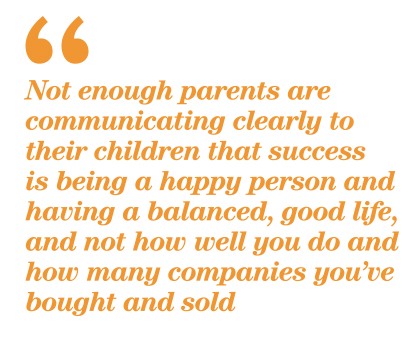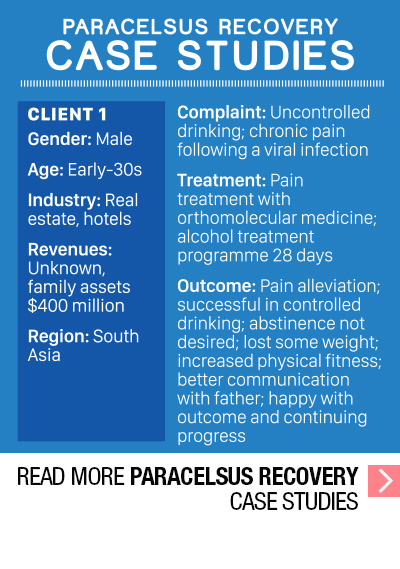Poor little rich kids: how mental health is affecting the next generation

Mental health has been called the biggest unaddressed health challenge of our age, and those most at risk often sit at the two extremes of the socioeconomic spectrum. Michael Finnigan investigates
When Texan teenager Ethan Couch killed four and injured nine in a drink driving incident in 2013 few expected he'd dodge prison. Perhaps even more surprising was the defence put forward by his attorneys: that the then 16-year-old suffered from affluenza (a portmanteau of affluence and influenza) and a term used to describe a psychological illness affecting young wealthy individuals. Symptoms can include an inability to link actions with consequences, as was reported in this case. While Couch's single year of court-ordered rehab was a notoriously difficult pill to swallow it gave credibility to the growing issue of mental health issues among those born into privilege.
 It's one saving grace in exceptionally tragic circumstances, albeit one that will bring little solace to the victim's families. Yet the consensus among health professionals is that affluenza is a genuine and growing disorder. While empirical evidence supports their stance, the public has to grapple with one all-important question: what do the wealthy have to complain about?
It's one saving grace in exceptionally tragic circumstances, albeit one that will bring little solace to the victim's families. Yet the consensus among health professionals is that affluenza is a genuine and growing disorder. While empirical evidence supports their stance, the public has to grapple with one all-important question: what do the wealthy have to complain about?
Quite a lot if you're to believe the experts. As the middle-class struggle to make ends meet, but in the process find meaningful lives, some of those born into wealth struggle to find a reason to get up in the morning. According to a growing body of research, this leaves them at a higher risk of problems in several domains, particularly anxiety, depression, and substance abuse, and is often linked to pressure to achieve and isolation from parents.
In a more general sense, the rich are often treated with prejudice, envy and scorn—particularly since the financial crisis. As a demographic their value is regularly called into question. But should this come as a surprise when the news is so often filled with stories of tax evasion, societal problems brought about by the disparity between rich and poor, and unabashed flaunting of wealth? It's a question that won't be answered here, but it all amounts to feelings of shame and isolation among the wealthy—two major contributors to mental health imbalances.
“One of the causes of mental health issues among the younger generation of wealthy families is pressure from their parents,” says Jan Gerber, managing director of Paracelsus Recovery, a Switzerland-based treatment facility for ultra-high net worth individuals. “For example, an individual might feel the pressure to perform in certain ways, such as one day taking over a position in the family business. They find that their life is planned out from day one and that's a huge amount of pressure for any person.”

Gerber, who studied at the London School of Economics and manages the administration of the business, albeit with an eloquent understanding of medical issues, says the younger generation of wealth often resort to antidepressants, drugs or alcohol as a coping mechanism. The problem is so rife in the Middle East that he estimates almost 80% of the children of wealthy families regularly use antidepressants.
While the pressure of inheriting a business can be daunting, a lacking succession plan can be equally problematic, says Philip Marcovici, principal at Offices of Marcovici and author of The Destructive Power of Family Wealth. He provides the example of a family in which there has been a premature death: “What happens when a family has no succession plan? Is it healthy for someone at age 22 or 23 or 25 to come into £5 million, or £10 million or £50 million or £100 million pounds? How is that going to affect their motivation to work? How is it going to affect the parents' ability to continue to parent that child?”
Another issue that commonly impacts wealthy youth he says is so-called 'affluent neglect,' wherein children of wealthy families are overindulged with cash or material possessions while at the same time being starved of love and affection. The oft-quoted example is that of a parent hiring a nanny, or sending their offspring off to boarding school then devote their spare time to travel, either for work or for pleasure.
“It can be parents wanting the very best for their children,” Gerber explains. “Those who came from modest backgrounds, built a vast fortune, often then want their kids to have it better than they did. They basically spoil them with material wealth, yet don't realise what constitutes a healthy upbringing. It's about the right mix of boundaries of being strict while providing love, empathy and care.”

It is a point that rings particularly true in the case of Ethan Couch, who after completing his court-ordered rehab, skipped his probation and became the subject of a 2015 manhunt. After being detained in the Mexican resort city of Puerto Vallarta, Jalisco, Couch was sentenced to serve two years in jail having once again failed to grasp the consequences of his actions.
As is the case with Couch, Gerber points to a lack of purpose as being a major contributor to mental health problems among rich children. As family businesses grow, he says there are often several people who might find themselves benefiting financially but without a role at the business. Without any guidance there is an increased chance that they will throw themselves into the instant gratification of sex, drugs and status rather than find the inner fulfilment that comes from a career and contributing to one's society.
While drawing attention to the mental health issues of rich children increases awareness, it means very little without practical treatments. Take the aforementioned lack of purpose, for example. What is the best way to treat someone for a) a figurative concept like a lack of purpose and b) when said individual has enough money to survive for several lifetimes? It is a challenge that Jan Gerber struggles with several times per year.
 “We had a client who grew up with very wealthy parents then got disinherited, but met a very wealthy husband. She'd never worked a day in her life,” Gerber says, referring to a client who came to Paracelsus Recovery suffering from severe depression. “But somehow she always wanted to become a massage therapist. The fact that she had tens of millions in the bank stopped her from pursuing her goal.”
“We had a client who grew up with very wealthy parents then got disinherited, but met a very wealthy husband. She'd never worked a day in her life,” Gerber says, referring to a client who came to Paracelsus Recovery suffering from severe depression. “But somehow she always wanted to become a massage therapist. The fact that she had tens of millions in the bank stopped her from pursuing her goal.”
Reframing the purpose of a career in massage therapy from salary to a pursuit of happiness helped to convince the patient to pursue her goal. Six months later she completed a formal accreditation in massage—a first for the thirty-something, who dropped out of higher education—and is currently working part-time as a masseuse. Gerber worries her success might be the exception to the rule.
“Going out to work as a waitress or a driver, in theory, makes sense,” he explains. “A lot of things make sense on paper. But then if you look at it pragmatically, you have to ask the question: will someone actually do that, will they really engage in the experience, or will they be like, okay, I just did my two months and then I can tell daddy I did it. So it's a question of intrinsic motivation, what do they really want?”
While there is a chance Gerber's millionaire masseur is in fact an anomaly, evidence suggests the secret to good mental health is a life filled with meaning and purpose. Psychiatrist and Holocaust survivor Viktor Frankl, for example, summed up his experience at Auschwitz in his best-selling novel, Man's Search for Meaning: “Life is never made unbearable by circumstances, but only by lack of meaning and purpose.” A study published in Psychological Science, a journal of the Association for Psychological Science, again confirm his conclusion, suggesting that a purposeful life can even help individuals live longer.
Seeking out help is often the first step towards the 'answer', but in the world of wealth it can bring its own issues. So-called 'doctor shopping', wherein either individuals seek out numerous doctors to obtain multiple prescriptions or the medical opinion they wish to hear, is a growing problem, according to Gerber. The problem is that doctors are not aware that conflicting medications are being taken in tandem, and the result can often be fatal.
 Assuming the individual avoids the morgue, the best way to check for both 'doctor shopping' and chemical imbalance is through a statistical approach. Many treatment facilities compare samples against a database of the population based on age, sex and other criteria, which gives a frame of reference. If an individual is deemed to have either an overabundance or deficiency of a certain vitamin or hormone, an action plan can be put in place.
Assuming the individual avoids the morgue, the best way to check for both 'doctor shopping' and chemical imbalance is through a statistical approach. Many treatment facilities compare samples against a database of the population based on age, sex and other criteria, which gives a frame of reference. If an individual is deemed to have either an overabundance or deficiency of a certain vitamin or hormone, an action plan can be put in place.
Gerber says the data should, however, not be taken as the be all and end all of treatment. “We still have to look at this with caution, because people are different, and sometimes a low value of something doesn't necessarily mean that we've found the problem. It is a good starting point, and in most cases, the biochemical aspect is at least one significant piece of the puzzle. Although sometimes it can also be the solution.”
Even with these increasingly sophisticated treatments, the problem of mental health is only going to intensify, explains Marcovici, who points to the abuses of the elder generation (not contributing to society) and banking systems (facilitating tax evasion) as prompting a major backlash that will take decades to heal. This he says will influence the mental health of both wealthy next gens and their less affluent peers as they look to redefine the errors of the past. He suggests that the elder generation speak up and provide a healthier explanation for success to help facilitate the process now.
“Not enough parents are communicating clearly to their children that success is being a happy person and having a balanced, good life, and not how well you do and how many companies you've bought and sold,” he explains. “Why can there not be proper respect for success being somebody who is doing well in their community, or who is doing absolutely nothing and is actually very happy and contributing to the family in other ways. What I'm always worried about with families is that they are regularly robbing their children of their dreams.”

One of the first to recognise the higher precedence of mental health issues among wealthy children was Suniya Luthar, foundation professor of psychology at Arizona State University and professor emerita at Columbia University's Teachers College. Luthar has made it her mission to answer any media request on the subject in order to raise awareness, a point she claims is the first step in creating change. She was regularly called upon to comment on the case of Ethan Couch, but her expertise in the subject came about by chance.
“The first set of findings were completely fortuitous,” explains Luthar, who was working on a study of children in the 10th grade. “I had recruited an upper-middle class sample to essentially serve as a comparison group for research I was doing with very low-income inner city kids. And in looking at the comparative data, found to my surprise that the affluent kids were actually doing much more poorly, especially on drug and alcohol use and to some degree depression and anxiety as well. That was way back in the late 1990s.”
Luthar has returned to the topic many times since finding higher levels of depression, anxiety, and alcohol and drug misuse among affluent teens across the US. She suspects the same can be said of cultures across the world.
Like the previous two commentators, she points to pressure to achieve as a major contributor to these issues, particularly from parents, educators, schools, and even the children themselves. A further issue she says is a lack of sympathy or support from society itself, along with the concept of success being tied to academic and financial achievements. While it is helpful to understand the reasons, what is the best way to tackle these issues as we move forward?
 “It's the same as with any prejudice or stereotype against any group, whether gays or lesbians or kids in the inner city—humanising it,” she explains. “The more people get to see these are real people like you and me, they're not cardboard cut-outs, they're not bad people, they're decent human beings, and they're vulnerable to making mistakes just like everybody else. Just like when people say 'oh this whole generation of Millennials, they're narcissistic and entitled'. Who does that help? That helps nobody.”
“It's the same as with any prejudice or stereotype against any group, whether gays or lesbians or kids in the inner city—humanising it,” she explains. “The more people get to see these are real people like you and me, they're not cardboard cut-outs, they're not bad people, they're decent human beings, and they're vulnerable to making mistakes just like everybody else. Just like when people say 'oh this whole generation of Millennials, they're narcissistic and entitled'. Who does that help? That helps nobody.”
A further solution is for parents, who should ensure they keep channels of communication open with their children. “Be aware of what they are doing and saying, and be very watchful of your own values,” she says. If not, the children will notice one's true opinion through non-verbal interactions. She says that parents should take a “good hard look” at their value systems and decide whether their advice truly rings true.
This brings us full circle to the question posed by the public at the beginning of the article: what do the wealthy have to complain about? According to Luthar, it is more about being compassionate to the struggles of others.
“The term affluenza is not a scientific term, but the phenomenon that it represents is real,” Luthar explains. “We need to help our kids understand that the drive to get ahead at all cost comes at a cost. So when you see that your child is unhappy or miserable pursuing a goal, like staying on a highly competitive swimming or debate team, if it is getting to a point where they are not sleeping, depressed, or exhausted, then it is not worth it. It's time to drop the damned activity.”
So is 'affluenza' the latest excuse for the wealthy to do whatever they want or is it a genuine problem for those born into privilege? If you're looking for an answer, the best place to look might be the other side of the dining table—the hope is that Ethan Couch isn't staring back.
-







